In 2018, Paul Grondahl interviewed Fred and wrote an article which appeared in the Times Union on October 23, 2018. While Fred extended his time until retirement, leaving at the end of 2020 instead, we would like to again share this wonderful article about Fred’s career and his historic impact on Living Resources!
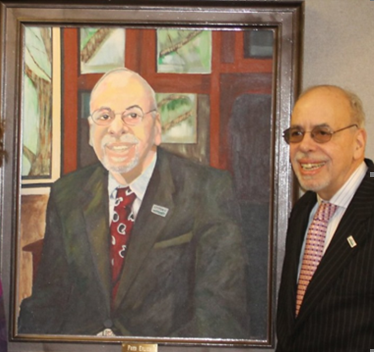 A year or so from now, Fred Erlich is going to have a very difficult time stepping down as founder, CEO and executive director of Living Resources.
A year or so from now, Fred Erlich is going to have a very difficult time stepping down as founder, CEO and executive director of Living Resources.
Just mentioning it causes his voice to thicken. A knot forms in his throat.
For four decades, the humble administrator has inspired and led by example, a paternal presence who bonded with dozens of clients with developmental disabilities and hundreds of staff who assisted them with loving care and tender mercy.
It is a special calling and Erlich’s army, as I have come to think of them, are foot soldiers in the long arc of society’s struggle to accept and embrace people once feared and shunned, warehoused in deplorable conditions out of sight because of their differences.
As we walked from his office down a flight of stairs on a recent evening at the 52,000-square-foot red brick headquarters along Washington Avenue Extension, we were waylaid for nearly 15 minutes. Erlich stopped at numerous photos on the walls and told story after story of men and women with cerebral palsy, Down syndrome, autism spectrum disorder and traumatic brain injuries. They lived with dignity and achieved their fullest potential after other agencies had written them off.
He spoke of them, and of their special gifts as an artist or a musician or a friend. He never mentioned their disability, unless I asked. He praised their families for being advocates in their care.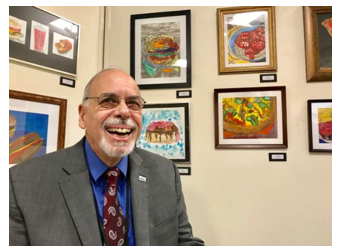
“It’s going to be hard to retire because Living Resources has been my baby,” he said. “But it’s time.”
Erlich, 70, will retire Dec. 31, 2019. He has been the only CEO in the history of the not-for-profit organization he helped found with his professor, the late Donald Traunstein, in 1973 while Erlich was a graduate student at the University at Albany.
Erlich and his wife of 40 years, Elizabeth Vandercar, a former nurse, have three children and three grandchildren. They live in Delmar.
“Fred has been wholeheartedly committed to the mission of Living Resources from the beginning. He has a passion for making sure people with disabilities are treated with the respect and dignity they deserve,” said Emeritus Bishop Howard Hubbard of the Albany Roman Catholic Diocese, who served as the first board president of Living Resources when it was founded 45 years ago.
Hubbard was a street priest in Albany’s South End and a founder of Providence House and Hope House, programs that provided services to poor people, those addicted to heroin and others on the margins of society. Hubbard was not prepared for the vitriol he and Erlich encountered at suburban public meetings when Living Resources proposed its first group homes.
“Those were some of the stormiest meetings I’ve ever attended in my life,” recalled Hubbard, who turns 80 on Oct. 31. “It came down to lack of knowledge and irrational fears. They made it very difficult to get approval to open our first homes.”
Erlich and his team would not be denied. He had seen the horrors of the alternative. As a master’s degree student in social welfare at UAlbany in 1971, Erlich got a summer job at Brooklyn Psychiatric Hospital, not far from where he grew up. “It was so appalling, with absolutely horrible conditions,” Erlich said. He likened the abuse and neglect he witnessed to scenes in the movie “One Flew Over the Cuckoo’s Nest.”
Around the same time, a young journalist named Geraldo Rivera caused a stir with an exposé of Willowbrook on Staten Island, which became the symbol of all that was wrong with the state psychiatric system: severe overcrowding, ill-trained and abusive staff, inhumane practices and a shocking lack of human dignity.
The Willowbrook scandal led to a class-action lawsuit in 1972 and New York state’s consent decree in 1975 that mandated de-institutionalization of more than 25,000 developmentally disabled New Yorkers from grim human warehouses like Willowbrook.
Erlich, the mild-mannered social worker, instilled moral outrage in his staff. “I met so many people in institutions who did not belong there,” he said. “I said, ‘We need to make this right and do better for them.’ ”
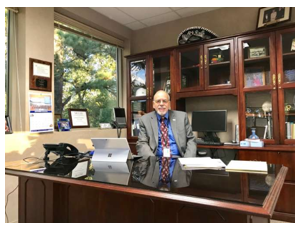 Erlich has guided Living Resources through sustained growth, beginning with a single adult group home, a few staff members and a six-figure budget.
Erlich has guided Living Resources through sustained growth, beginning with a single adult group home, a few staff members and a six-figure budget.
Today, he oversees 890 employees who serve 2,200 individuals (including 200 living in 38 group homes across the Capital Region) and a $43 million budget. They maintain 180 vehicles that drive clients to programs across a 10-county region. In 2005, Living Resources partnered with The College of Saint Rose to launch The College Experience, a two-year residential noncredit certificate program. One of the first programs of its kind in the country, it has assisted more than 100 people with developmental disabilities practice living independently, build a network of friends and find internships at local businesses.
The Willowbrook scandal led to a class-action lawsuit in 1972 and New York state’s consent decree in 1975 that mandated de-institutionalization of more than 25,000 developmentally disabled New Yorkers from grim human warehouses like Willowbrook.
Erlich, the mild-mannered social worker, instilled moral outrage in his staff. “I met so many people in institutions who did not belong there,” he said. “I said, ‘We need to make this right and do better for them.’ “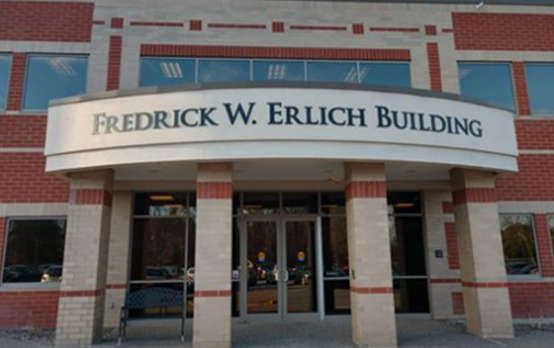
Erlich has guided Living Resources through sustained growth, beginning with a single adult group home, a few staff members and a six-figure budget. Today, he oversees 890 employees who serve 2,200 individuals (including 200 living in 38 group homes across the Capital Region) and a $43 million budget. They maintain 180 vehicles that drive clients to programs across a 10-county region. In 2005, Living Resources partnered with The College of Saint Rose to launch The College Experience, a two-year residential noncredit certificate program. One of the first programs of its kind in the country, it has assisted more than 100 people with developmental disabilities practice living independently, build a network of friends and find internships at local businesses.
“Fred is very entrepreneurial in his leadership and he finds creative ways to help people live with dignity,” said board member Teresa Stellar. “He truly believes that every person matters and he will do everything possible to help them live independently, despite funding cutbacks and overstretched resources.”
Erlich’s biggest challenge is economic. He insists that nearly all of Living Resources’ clients have a private bedroom. The group homes have five residents on average. The annual cost of care is about $90,000 per person. Labor costs continue to rise about 15 percent annually. The starting wage is $11.40 an hour. Erlich points out their employee annual turnover rate is 18 percent, compared to 32 percent nationally.
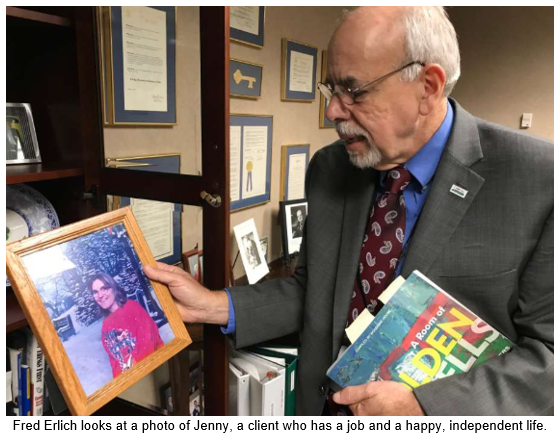 Erlich received an MBA in 1994 from UAlbany so he would be better equipped to deal with the financial challenges, but the numbers still keep him up at night. A search firm will look for Erlich’s successor, who will face ongoing fiscal challenges.
Erlich received an MBA in 1994 from UAlbany so he would be better equipped to deal with the financial challenges, but the numbers still keep him up at night. A search firm will look for Erlich’s successor, who will face ongoing fiscal challenges.
The next CEO will also inherit a culture created by Erlich, who put his heart into more than the organization’s logo. Let him tell you about Paul, whose IQ increased 30 points once he was relocated from an institution. With the help of Living Resources, he got a job as a mechanic and lives independently. Or Jenny, who works at a Hannaford supermarket in Delmar, where Erlich and his grandchildren stop to talk with her on shopping trips.
We stop often at framed photographs. Client success stories pour out of Erlich, who is not quite ready to turn the page
